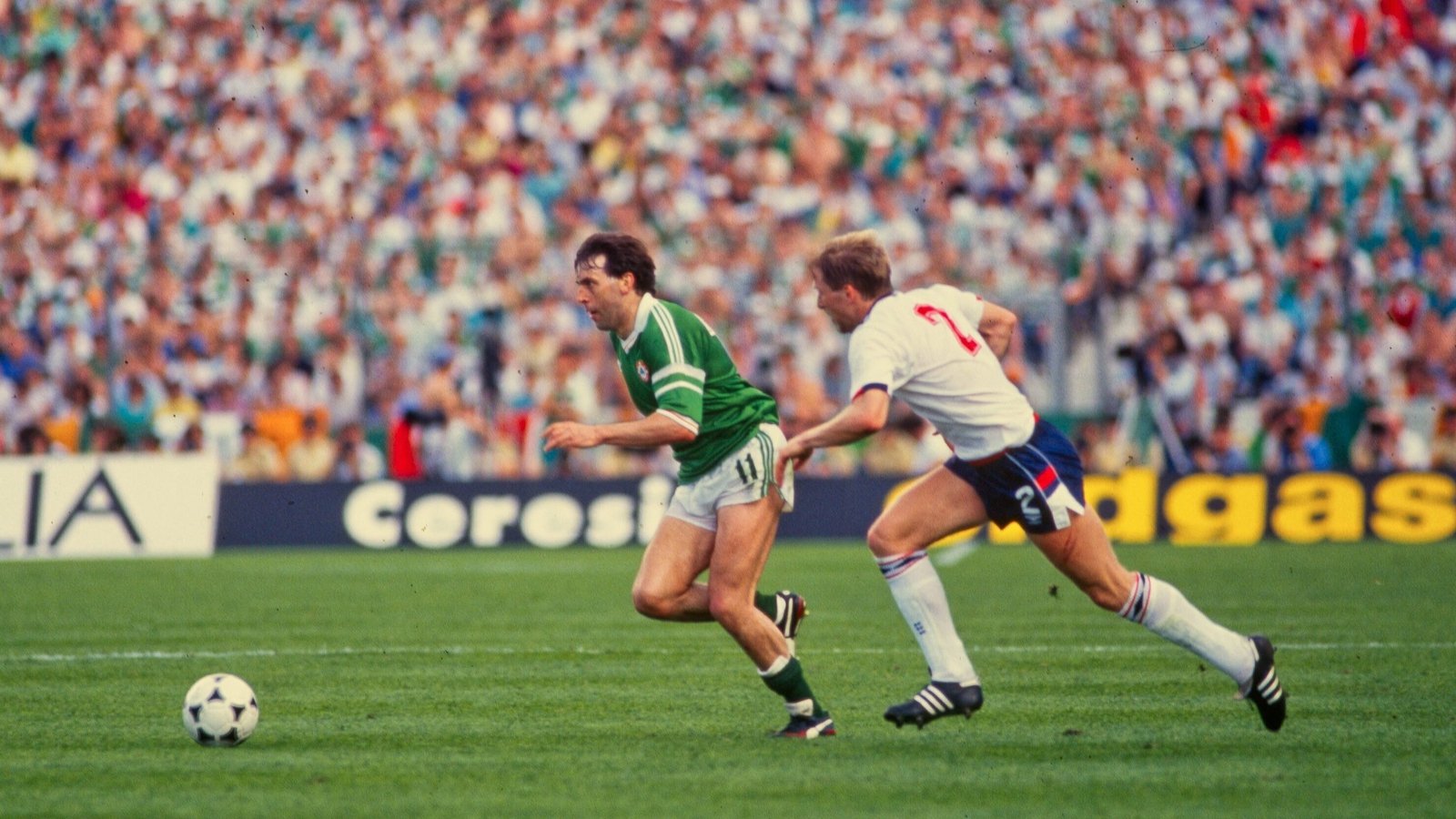The Republic of Ireland v England.
The Guardian’s Barney Ronay has described it as “an unlovely fixture for as long as anyone cares to remember”.
Though for a glorious period between 1988 and 1991, it brought Irish football fans only a sense of joy, relief and historical score-settling. Here are the highs and lows from this most contentious of footballing fixtures.
HIGHS
The contentious quiz question
21 September 1949: England 0-2 Ireland
We trust that this match has launched many a post-pub-quiz altercation in the UK, especially when an Irish team was involved.
No, the first foreign team to beat England on English soil was not Ferenc Puskas’ and his Magical Magyars, no matter how much you want it to be. It was Ireland, four years earlier. Look it up.
The game was on 21 September 1949, five months after Ireland had officially left the Commonwealth and declared itself a Republic.
England were preparing for their first tilt at the World Cup qualifiers, having finally deigned to enter the competition.
The FA had snubbed the World Cup in the pre-Second World War era partly on the grounds that the whole edifice called into question the FA Cup’s status as the greatest footballing competition on the planet.
For their first home match against the Republic of Ireland, they were without Stanley Matthews but Billy Wright and Tom Finney – the latter having scored the only goal in the first ever Ireland (FAI)-England game in Dalymount in 1946 – were involved.
Ireland would be captained by Manchester United’s Jackie Carey, who a few months earlier had been named as the second ever Football Writers’ Footballer of the Year in the English league.
The English press was serenely confident of victory, with Henry Rose of the Daily Express writing that anyone who foresaw anything other than a home win should promptly book themselves in for a session with a Harley Street psychiatrist.
The match was at Goodison Park, where away victories are the norm nowadays. Former Dublin inter-county footballer and then Aston Villa player Con Martin put Ireland in front from the penalty spot.
Shamrock Rovers’ Tommy Godwin pulled off a string of saves, impressing to such an extent that he earned a move to Leicester City almost immediately after the game.
Peter Farrell, later namechecked by Eamon Dunphy as one of those whose memory was insulted by Ireland’s display against Egypt in Palermo, scored the second five minutes from time to ensure a historic victory.
History is written by the winners, we’re told, though in this particular instance, the losers have made a pretty good fist at getting their narrative across.
Various encyclopaedic tomes on English football have sought to insist that Hungary were the first foreign team to beat England on English soil when they won, in swaggering fashion, in Wembley in 1953.
The assessment over here is that it was more flattering to think that the great Hungarian team of the 1950s, one of the most innovative and romantic sides in the history of the game, were the first to down England on home soil. This thesis has been promoted by Frank Johnstone, the Irish Times reporter who covered the game as a 20-year-old.
However, there could be other reasons.
Namely, (a) that they didn’t – and don’t – consider Ireland to be a foreign nation, really. Basically, they regarded us as no different to Scotland, who had already won several times in England in the pair’s thousand fixtures up until that point.
And (b) that they weren’t actually fully 100% on which Irish team they were playing. This is less ignorant than it sounds, given that several Irish players in this era – including Carey and Farrell – played multiple times for the FAI and IFA teams.
England recovered from the jolt to qualify easily enough for the 1950 World Cup in a process which doubled as the British Home Championship, defeating the IFA Ireland team (latterly, Northern Ireland) 9-2 in Maine Road.
But they were in for an even worse shock in Brazil itself, when they bumped out into the humble USA…
‘We’ll do them for yiz today’
12 June 1988: England 0-1 Ireland
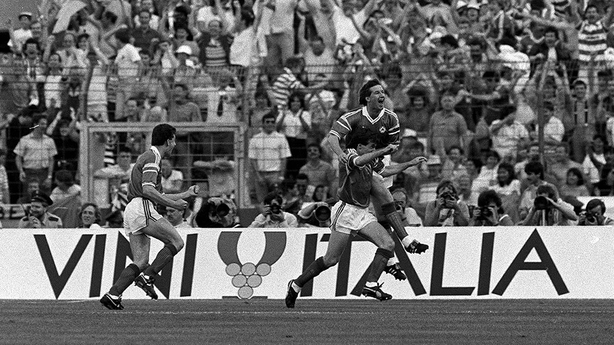
In ‘Euro Summits’, Jonathan O’Brien’s book on the history of the European Championships, he recalls that the country wasn’t exactly overcome with hype in the lead-up to their first ever Euros appearance.
“At face value, even Ireland’s own public barely rated them: only 12,000 turned up at Lansdowne Road for a friendly against Yugoslavia seven weeks before the finals,” he wrote.
The Guardian’s Paul Doyle later said that drawing England in our first ever game in a major tournament inspired a sense of sickening dread.
“All these years, we’ve been trying to get to these tournaments and we finally get there and it’s just to be humiliated by England in the first match… which isn’t how it turned out,” Doyle said on the ‘Vincera’ podcast.
The joy at the eventual victory was intensified by the sheer relief that this didn’t happen.
England, having done reasonably well at the ’86 World Cup after a slow start, and going through unbeaten in qualifying, were installed as second-favourites prior to the competition. As in 1949, they were blissfully confident before the Ireland game.
On ITV, Brian Clough was euphoric at Mick McCarthy’s selection at centre-half, which he said would have Lineker and Beardsley licking their lips.
Liam Brady, working with ITV from Stuttgart after an ACL injury had ruled him out of the tournament, referenced the comments in his half-time assessment, praising Big Mick’s solidity at the back.
Christy Moore’s account of the only goal “and then Ray Houghton got the ball and he stuck in the net!” is a rousing one, although hardly constitutes an accurate description of a looped header over Peter Shilton after Kenny Sampson had incompetently skied the ball up off his shin when attempting a clearance.
The breezy verdict on Ireland’s Euro 88 campaign is that “we won the game we should have lost, drew the game we should have won (Russia), and lost the game we should have drawn (Holland).”
This slightly self-depracting account mis-remembers that Ireland had chances of their own in the second half, with Shilton tipping Ronnie Whelan’s volley onto the crossbar, and Niall Quinn latterly failing, by inches, to get his head on Houghton’s cross.
Nonetheless, England obviously blew a host of chances, with Lineker the chief culprit, though Beardsley also skied one over the crossbar.
‘You’ll never beat the Irish’
27 March 1991: England 1-1 Ireland
The last three competitive fixtures between England and Ireland all occurred within a 10-month span between June 1990 and March 1991 and each ended 1-1, with Ireland equalising on all three occasions.
The Cagliari game was the most historically significant as Ireland’s first in a World Cup proper. As usual after England-Ireland games in this period, the English red tops were disgusted with their team and relations were frosty between the media and players in the days afterwards.
Not as disgusted as the Italian press was with the whole spectacle, mind. ‘No Football Please – We’re British’ was the headline on Corriere Dello Sport the following day, running roughshod over Irish sensibilities.
Three months later, they met in a Euro qualifier in Dublin. Graham Taylor was now in charge of England and was bringing his own brand of jittery over-thinking to the role. He dropped Gazza for the game in Lansdowne on the grounds that the ball would be swirling about in the air most of the time (a correct prediction, as it happens).
In his stead, Taylor picked the diminutive Villa midfielder Gordon Cowans, betraying, not for the last time, what Brian Glanville later described as his “strange penchant for second-class players.”
David Platt, who scored about 45% of all England goals between 1990 and 1993, put the visitors in front midway through the second half. Big Cas, sprung from the bench on the hour mark, equalised with a terrific looping header, sparking wild scenes on the South Terrace, with one chap in a leather jacket giving him a hug before any of his teammates could join in.
The best Irish display in the three-game sequence, however, was unquestionably the third instalment, in Wembley in March 1991.
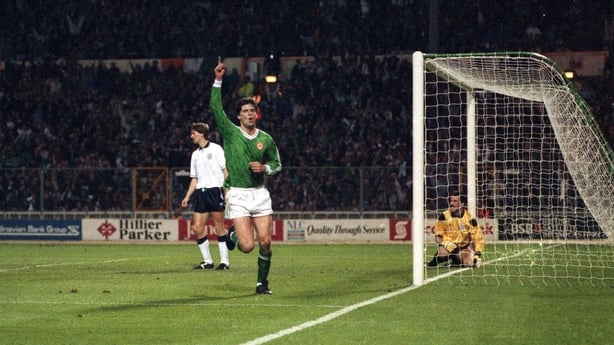
England went ahead through a lucky early goal, Lee Dixon’s drilled cross, ricocheting off Staunton’s shin and beating a wrong-footed Bonner at the near post.
But Ireland owned the rest of the first half.
During one extraordinary, harum-scarum three-minute spell, Ireland put England under ferocious pressure, raining cross after cross down on the English rearguard, consistently winning the second ball in the wake of every hurried half-clearance.
“And panic is beginning to spread back there,” John Motson exclaimed on the BBC commentrary at one stage during the barrage. “They just get the ball away!”
While Ireland couldn’t hustle a goal during that spell, they did a few minutes later. Paul McGrath, magnificant in the anchor midfielder role, looped over a cross, the in-form Niall Quinn scoring a deftly cushioned side-footer.
David O’Leary, back in favour by now, was at his elegant best at centre-half, forming a terrific partnership with Kevin Moran, who suitably wore a white head bandage that evening.
In the second half, what chances there were fell to the visitors, Sheedy missing from a tight angle and then Houghton side-footing wide when put straight through on goal. Afterwards, Charlton insisted his main feeling was one of annoyance that they hadn’t won.
Still, the Irish fans were jubilant at full-time and it now seemed that Ireland were in command of the qualifying group. It was a fourth time in less than three years that England had failed to beat Ireland and “You’ll Never Beat the Irish!” reverberated around Wembley.
“We slaughtered them,” Dunphy told Bill O’Herlihy back in the RTÉ studio.
Nine months after reaching the quarter-finals of Italia 90 and the consensus was that the Irish team were, if anything, getting better.
Unfortunately, Ireland would conspire to blow both games against Poland, tossing away a two-goal lead in Poznan and allowed Taylor’s incredibly mediocre team to go forth and stink the joint out at Sweden ’92.
LOWS
‘The timber in that stand has stood for years…’
15 February 1995: Ireland 1-0 England (game abandoned)
Folk of an older vintage may recall John Atyeo in 1957 and the silence that could be heard all the way down by Nelson’s Pillar.
But in modern times, there was the famously sinister evening in February 1995, when English hooligans launched one of their most dangerous and spectacular riots, lobbing missiles from the upper west stand onto the spectators below, hitting and injuring one photographer.
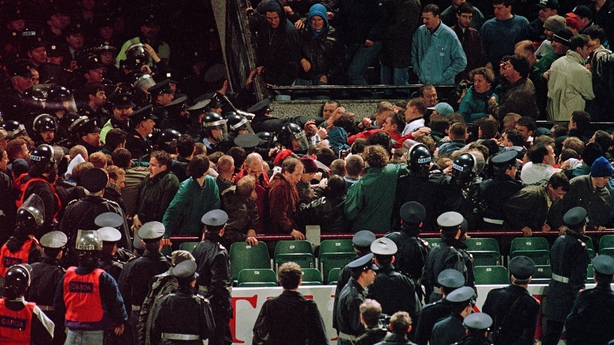
Here, we shall seek to rebrand the match as an Ireland victory – our third in the fixture! – as David Kelly drilled home a goal shortly after the 20th-minute mark, an event which sparked the riot that saw the game ended.
The Football Association, on the other hand, decided to award caps for the game but, for record purposes, regarded the game as a goalless draw.
The images are fairly vivid in the memory – the Nazi salutes, the crestfallen kid who had been on The Den that afternoon, an irate Charlton shouting at Irish supporters to ‘go home!’
It wasn’t the first time there had been trouble surrounding an Ireland-England game – there had been a pitched battle on O’Connell Street after the Euro ’92 qualifier in September 1990 (witnessed by a colleague at this desk). But that was away from the stadium and after the match.
There followed an inquest into how English supporters had positioned in that part of the ground, with Irish supporters mixed in among them.
There were also questions in the aftermath as to whether this placed England’s hosting of Euro ’96 into jeopardy, though the FA were swift in tamping that down, touting their own experience at handling the hooligan issue as a plus.
While there were questions about whether the Irish authorities had been naive, the Garda riot squad did appear to enjoy a bump in popularity afterwards, the force receiving an unusually high degree of praise from online nationalists for their forceful handling of the situation in the Youtube comments section in the years since.
Shorting Sterling
7 June 2015: Ireland 0-0 England
“An end of season waste of space,” Paul Scholes labelled this fixture and that was probably one of the kinder verdicts.
The English press sought to outdo each other in their withering verdicts on the game and on the performance of Roy Hodgson’s team in particular.
For Ireland itself, the outcome wasn’t too bad, even if the whole thing was ultimately low-stakes. We had preserved our three-decade long unbeaten run against England and, indeed, had the best (half) chances.
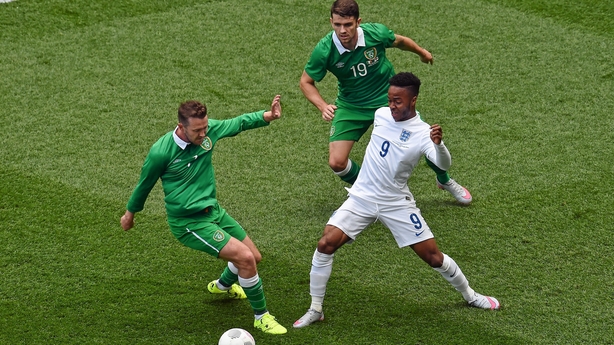
The biggest curiosity of the game arose when people began to notice that Raheem Sterling’s every touch was being booed by a sizable portion the home support.
Sterling had offended the plain people of Ireland by signalling his intention to leave Liverpool in the early part of 2015, falling into an unseemly contract dispute with Brendan Rodgers.
All told, it wasn’t the proudest moment in the history of the Irish nation, the booing of an England player on the grounds that he had recently expressed a desire to transfer from one English league club to another.
League of Ireland folk and those of the Dermot Keely persuasion regarded the whole episode with roughly the same level of visceral contempt that physical force nationalists did those scenes of Dublin locals lining the streets for the visit of King George in 1911.
A more heartwarming scene from the game was the reception in honour of Jack Charlton at half-time, heartily applauded by both sets of fans.
The video
12 November 2020: England 3-0 Ireland
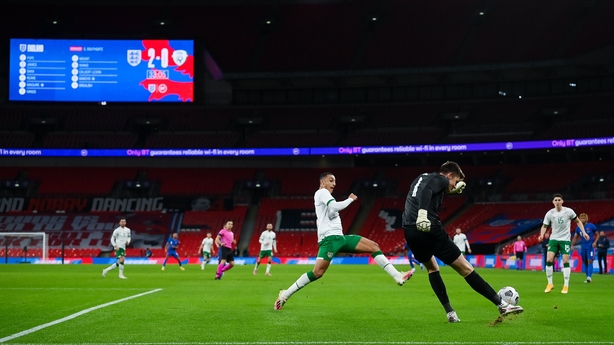
The first Ireland defeat to England in international football in many of our lifetimes – at least if you were born after March 1985.
England’s win was so emphatic, it was strange to think it ended a 35-year drought in the fixture, though that, it should be said, included an 18-year period when the two sides never met.
The match was hastily organised at the height of the pandemic, during a period when Irish supporters were beginning to fear that their team might never score a goal again.
Somewhat gallingly, Jack Grealish was the pick of the players on the evening, with Harry Maguire, Jordan Sancho and Dominic Calvert-Lewin. Jude Bellingham, another player familiar with the Irish jersey, made his international debut.
However, the game itself is a mere sideshow to what became the main event. Namely… Videogate!
Probably the most famous/ infamous unseen video since Roy Keane’s analysis of Manchester United’s 4-1 defeat to Middlesbrough in 2005-06.
The controversy sparked by a ‘motivational video’ shown by Stephen Kenny to the Irish squad before the game led to one coach resigning from the set-up (apparently due to the reaction to the video rather than the video itself) and the goalkeeping coach issuing a lengthy social media post angrily denying he had leaked the story to the English papers.
What was on the video, we wondered. Some imagined various rabble-rousing scenes from Irish films across the decades.
“The English are gone, Bull”
“Gone, because I DROVE THEM OUT!”
“It’s a sod of turf”
“No, that is a weapon”
“You have wrapped yourself in the Union Jack, the Butcher’s Apron!”
All to a soundtrack of the Dropkick Murphy’s.
Regrettably, the video wasn’t subject to FOI legislation. Perhaps, much like Keane’s ‘Play the Pundit’ appearance on MUTV, it was subsequently taken out and “destroyed”.
Those in the know tell us the video was a “three-minute montage splicing together previous Irish goals against England with scenes from Anglo-Irish history, including the 1916 Rising.”
In any case, the Daily Mail reported that several members of the Irish set-up were shocked at the “political” nature of the video, with one source branding it “anti-English”.
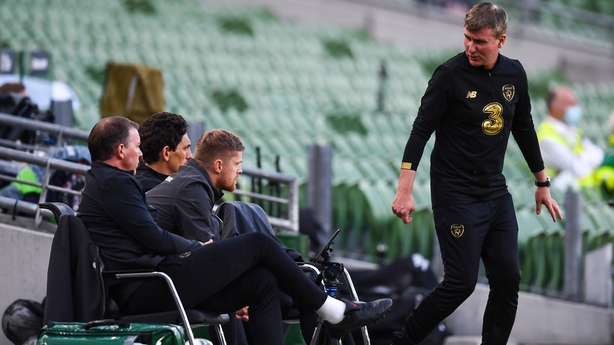
Damien Duff abruptly resigned from the Ireland coaching staff, after serving only a few months in the job.
The reasons for Duffer’s resignation were fairly opaque, though it appeared he was annoyed by the reaction to the video.
When discussing the Serbia game the following March, he said on RTÉ’s Champions League coverage: “Nearer the time, it’s obviously up to us staff not to make any motivational videos.
“Even if they are based on true historical events, Irish events that you should be proud of.
“They can be very offensive to some people, so we’ll stay away from that in March.”
Watch Republic of Ireland v England in the UEFA Nations League on Saturday from 4pm on RTÉ2 and RTÉ Player. Follow a live blog on rte.ie/sport and the RTÉ News app and listen to commentary on RTÉ Radio 1

